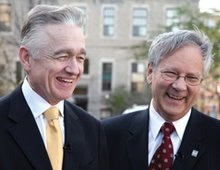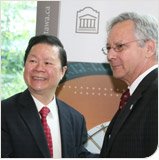OCLA press release: ENGLISH / FRANCAIS
The letter is posted here: OCLA-LINK.
May 19, 2015
The Attorney General of Ontario
Constitutional Law Branch
4th floor
720 Bay Street
Toronto, Ontario M5G 2K1
fax: (416) 326-4015
Hon. Madeleine Meilleur:
Re: Notice of Constitutional Question, Court of Appeal for Ontario File No. C59074
St. Lewis v. Rancourt
The Ontario Civil Liberties Association (OCLA) is a proponent of freedom of expression for all Ontarians, on all issues. OCLA is concerned that freedom of expression is in decline in Ontario.
You have been served with a Notice of Constitutional Question (“Notice”), in the above-cited appeal that is listed to be heard in Toronto on Friday, June 26, 2015. A copy of the Notice is attached.
The questions raised in the Notice are vital constitutional questions about the Canadian Charter of Rights and Freedoms guarantee of freedom of opinion and expression for all citizens of Ontario.
Defamation law is the main legal instrument used to infringe or deny the Charter right of freedom of opinion and expression, and it is the dominant government-sponsored source of chill against free expression in our society.
OCLA asks that you intervene in this appeal in order to protect the Charter right of expression for all citizens of Ontario. This is particularly important because the defendant/appellant in this case is self-represented, while being opposed by a major law firm being financed without limit using public money.
The common law tort of defamation is in direct opposition to the Charter right of expression, and it is the only tort in which both malice (of defamation) and damages are presumed, rather than needing to be proved by the plaintiff. In this tort, the defendant has a reverse onus to show that the particular defamation is protected by law by virtue of a pleaded common law or statutory defence.
Under such legal circumstances, it was an egregious violation of the appellant’s Charter right of expression for the trial judge to refuse to put the defendant’s defences to the jury, which were pleaded defences that were never struck out, and for which there was ample supporting evidence on the trial record.
OCLA asks that you make a representation in this appeal that barring pleaded and standing defences in a defamation trial is incompatible with the Charter right to freedom of opinion and expression.
The second of three constitutional issues in the Notice is that the recent common law of permanent injunctions (permanent gag orders), against a defendant following a finding of defamation, includes permanent prohibitions of unknown expression, and is thus unconstitutional.
The said common law has never been challenged previously in an appellate court in Canada.
This unfortunate recent development in Canadian common law is at odds with Canadian values of freedom of expression, and the said common law expressly discriminates on the basis of financial means.
OCLA asks that you make a representation in this appeal that the said recent common law of permanent injunction in defamation cases is incompatible with both Charter and Ontario values.
Finally, the Notice challenges the constitutionality of massive costs of trial against an individual defendant, opposed by unlimited public money, in a defamation case.
The excessive chill on expression from extravagant defamation-trial costs ordered against a defendant, while not actually paid by a private plaintiff, is evident. In this case, the trial court permanently barred a blogger from future unknown expression because he has no money, and then turned around and ordered him to pay the huge legal costs of trial, even though the costs had already been paid in full using public money.
Furthermore, such a costs order, in the circumstances of this case, is in violation of Canada’s (and Ontario’s) obligations under the International Covenant on Civil and Political Rights.
OCLA asks that you make a representation in this appeal to argue that costs such as those ordered in the circumstances of this case are an unreasonable suppression of the Charter right of freedom of opinion and expression.
Your contributions in this appeal are essential to ensure that the law constraining the Charter right of freedom of opinion and expression is consistent with the values of Ontario’s free and democratic society, and with international obligations.
Yours truly,
Mark Mercer, PhD
Chair, Department of Philosophy, Saint Mary’s University
President, Society for Academic Freedom and Scholarship
Member, OCLA Advisory Board
Department of Philosophy
Saint Mary’s University
923 Robie Street
Halifax, NS
B3H 3C3
Ontario Civil Liberties Association
180 Metcalfe Street, Suite 204
Ottawa, ON
K2P 1P5
(Letter footnotes are excluded, see link for original.)





No comments:
Post a Comment